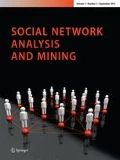Abstract
Current approaches for asserting trust focus on propagating known trust values amongst peers in a trusted network and do not provide measures for asserting a trust value from user interactions between peers. Moreover, Social Web applications assume that all users connected in one’s social graph share the same level of trust. These platforms do not provide any means to capture and differentiate trust levels amongst one’s connected peers. This makes it difficult for users to decide whom to trust and they have to rely on limited knowledge—their own or recommended by other peers. In this work, we present a trust framework for automatically asserting subjective trust values for connected users based on social user interactions—actions that provide users to interact with one another within a Social Network. In this work, we describe our model how we assert trust from these interactions. We also present our Trust Manager that automatically asserts user’s subjective trust values based on our model. These trust values help users to decide who is more trustworthy and with whom they can share their personal information.









Similar content being viewed by others
Notes
If this information is already in RDF, then only the new information is extracted and structured in RDF.
Facebook Graph API—https://developers.facebook.com/docs/reference/api/.
Twitter Rest API—https://dev.twitter.com/docs/api/1. 1
Relationship—http://vocab.org/relationship/.html.
SIOC—http://sioc-project.org/.
Zemanta API—http://www.zemanta.com/.
Linked Open Data Cloud—http://lod-cloud.net/.
ARC2—http://arc.semsol.org/.
References
Artz D, Gil Y (2007) A survey of trust in computer science and the semantic web. Science, Services and Agents on the World Wide Web, Web Semantics
Giunchiglia F, Shvaiko P, Yatskevich M, Giunchiglia F (2004) S-match: an algorithm and an implementation of semantic matching. In: Proceedings of ESWS
Goel S, Hofman JM, Sirer MI (2012) Who does what on the web: a large-scale study of browsing behavior. In proceedings of the sixth international conference on weblogs and social media, ICWSM2012
Golbeck J (2006) Generating predictive movie recommendations from trust in social networks. In Trust Management, iTrust’06
Golbeck J (2009) Trust and nuanced profile similarity in online social networks. ACM Transactions on the Web
Golbeck J, Hendler J (2004) Accuracy of metrics for inferring trust and reputation in semantic web-based social networks. In knowledge engineering and knowledge management, EKAW’04
Golbeck J, Hendler J (2006) Inferring binary trust relationships in web-based social networks. ACM transactions on internet technology
Golbeck J, Parsia B, Hendler J (2003) Trust networks on the semantic web, In cooperative intelligent agents
Grandison T, Sloman M. A survey of trust in internet applications. IEEE communications surveys and tutorials
Guha R, Kumar R, Raghavan P, Tomkins A (2004) Propagation of trust and distrust. In proceedings of the 13th international conference on world wide web, WWW’04
Hartig O (2009) Querying trust in rdf data with tsparql. In European semantic web conference, ESWC’09
Kim YA, Le M-T, Lauw H, Lim E-P, Liu H, Srivastava J (2008) Building a web of trust without explicit trust ratings. In data engineering workshop. ICDEW 2008. IEEE 24th international conference on, 2008
Kim YA, Song HS (2011) Strategies for predicting local trust based on trust propagation in social networks. Knowledge-Based Systems
Liu H, Lim E-P, Lauw HW, Le M-T, Sun A, Srivastava J, Kim YA (2008) Predicting trusts among users of online communities: an epinions case study. In proceedings of the 9th ACM conference on electronic commerce, EC ’08
Marsh SP (1994) Formalising trust as a computational concept. PhD thesis, University of Stirling
Mui L, Mohtashemi M, Halberstadt A (2002) A computational model of trust and reputation for e-businesses. In Hawaii international conference on system sciences, HICSS ’02
Olmedilla D, Rana OF, Matthews B, Nejdl W (2005) Security and trust issues in semantic grids, In semantic grid
Sacco O, Breslin JG (2013) I like—analysing interactions within social networks to assert the trustworthiness of users, sources and content. In ASE/IEEE SocialCom’13
Sacco O, Passant A (2011) A privacy preference manager for the social semantic web. In semantic personalized information management workshop, SPIM’11
Sacco O, Passant A (2011) A privacy preference ontology (PPO) for linked data. In linked data on the web workshop, LDOW’11
Sacco O, Passant A, Decker S (2011) An access control framework for the web of data. In IEEE TrustCom-11
Sacco O, Passant A, Decker S (2013) Fine-grained trust assertions for privacy management in the social semantic web. In IEEE TrustCom-13
Shvaiko P, Giunchiglia F Yatskevich M (2009) Semantic matching with s-match, In semantic web information management
Ziegler C-N, Golbeck J (2007) Investigating interactions of trust and interest similarity. Decision support systems
Author information
Authors and Affiliations
Corresponding author
Additional information
This work is funded by the Science Foundation Ireland [Grant SFI/08/CE/I1380 (Líon 2)] and by an IRCSET scholarship co-funded by Cisco systems.
Rights and permissions
About this article
Cite this article
Sacco, O., Breslin, J.G. In users we trust: towards social user interactions based Trust Assertions for the Social Semantic Web. Soc. Netw. Anal. Min. 4, 229 (2014). https://doi.org/10.1007/s13278-014-0229-x
Received:
Revised:
Accepted:
Published:
DOI: https://doi.org/10.1007/s13278-014-0229-x




